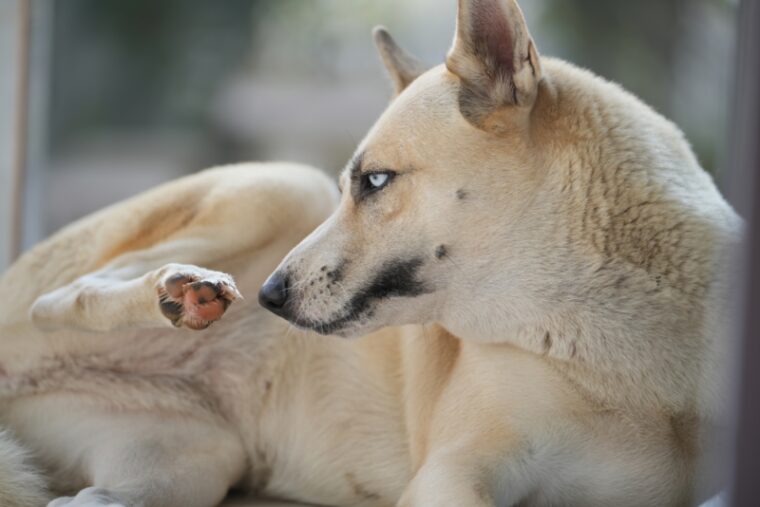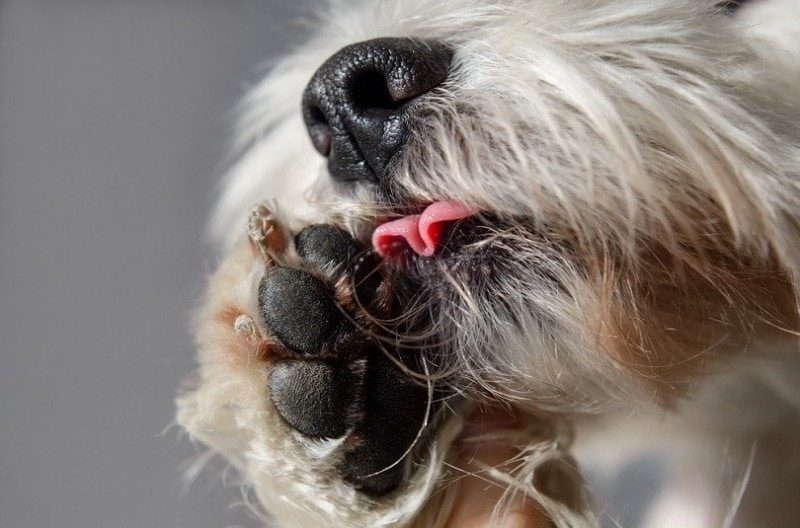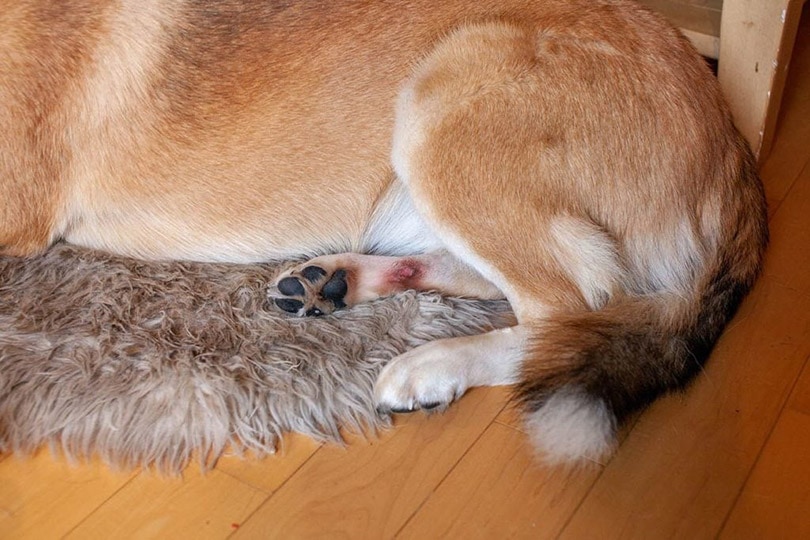
Dogs are full of personality and have their own habits and behaviors. You may find them biting their own feet and paws and wonder why they are doing so. Dogs lick and chew on their paws and limbs as part of their normal grooming routine. But when do we consider this behavior cause for alarm?
In this article, we explore seven different reasons why your dog chews on their feet, signs to watch out for, and what we can do to help!
The 7 Reasons Why Your Dog Chews and Bites His Feet
1. Occasional Grooming

Occasionally, you may find your dog licking itself. This is a normal grooming behavior and is not limited to their paws and feet. You may also find them licking other parts of their body, including their genitalia. Sometimes they are just relieving themselves from a simple itch!
Dogs may develop a habit of chewing and licking their limbs, but only in moderation. Should you notice any visual signs or excessive chewing on a particular area, it is often a sign of a skin condition in need of medical management.
2. Allergies
Allergic reactions are caused by an immune response to allergens found in food or in the environment. This may cause redness, swelling, and itchiness on the skin, which is why you might find your dog chewing on that area. You may also notice redness and swelling around the eyes and nose when your dog is experiencing allergies.
Certain ingredients in food, as well as environmental factors like pollen, mold, or even dust in your furniture, can cause allergies. Changes in weather can also cause dryness of the skin, making it very uncomfortable and itchy for your dog. As dog owners, it’s important to identify what types of foods work and to what your dog may be allergic to. It is also recommended to keep your dog’s environment clean to prevent any environmental allergens from causing your dog discomfort. Persistent allergic reactions can cause dermatitis and may need medical management.
3. Dermatitis
Dermatitis is caused by skin irritation due to allergens or bacterial problems. They can also occur when your dog’s skin encounters certain chemicals found in the grass or in the yard. Dermatitis can also develop due to poor hygiene, which is why it is recommended that you keep your dog’s paws and limbs clean.
If dermatitis persists, your veterinarian may prescribe topical medication such as creams, ointments, and special shampoos. Oral medication may also be prescribed for more severe symptoms of dermatitis.
4. Bacterial or Fungal Infection

Numerous bacterial and fungal infections can develop on your dog’s itchy lesions if left untreated. The moisture caused by constant licking can provide an environment for bacterial and yeast infections to develop. Infections can be identified by aggressive itching, swelling, redness, and maybe even discharge on the lesions for more severe cases.
Immediate veterinary management is recommended to stop the infections from getting worse. Once the causative agent of the infection has been identified through examination, your veterinarian will most likely prescribe topical or oral antibiotics for bacterial infections, and antifungals for fungal infections such as yeast and ringworm.
The sooner you consult with your veterinarian, the better and quicker the healing process will be. Early intervention will also prevent the condition or infection from getting worse.
5. Parasites
Dogs are energetic and love to explore. If your dog finds itself exploring in the woods or the city, parasites can be one of the biggest concerns for dog owners. These tiny pests, such as ticks, fleas, and mites, may irritate your dog, and their solution may be to chew on them.
Ticks may be big enough for dogs to chew away, but they may still be at risk for Lyme disease. Fleas can cause massive itchiness and irritation but often go unnoticed unless they are large in number. Mites can be equally irritating but are microscopic and burrow inside your dog’s skin, so they won’t simply go away through chewing.
If you find your dog gnawing on their feet with visible signs of irritation, then you can suspect a parasite causing the discomfort. It is best to consult a veterinarian for proper assessment and recommend treatment to eliminate these parasites.
6. Injury and Pain
Your dog may be chewing at their feet due to injury or pain. Injuries such as cuts, punctures, torn nails, burns, or foreign objects stuck in between their paw pads can cause your dog to chew on them. If you suspect this type of injury, inspect your dog’s feet for any foreign objects, swelling, or bleeding. Although injuries of this nature can easily be remedied through basic first aid, it is important to keep the area clean to prevent any further infection and irritation.
Other causes of leg chewing can include musculoskeletal injuries. Your dog may experience pain inside their leg, be it the muscle or the bone. Try to see if your dog is limping while walking or if they have difficulty bearing weight on the limb.
If you find your dog experiencing these types of injuries, remember to keep the area clean and prevent any behaviors that can worsen the injury, such as excessive licking and chewing or excessive activity if the muscle or bone is injured.
7. Behavior

Issues in behavior and emotion can also cause excessive licking and chewing of your dog’s paws. Your dog can experience boredom, anxiety, and even stress.
Like people, dogs look for ways to stimulate themselves if they get bored. Dogs can chew on their feet if they find themselves lacking mental or physical engagement. To alleviate boredom, a few ways to engage your dog can be by taking them out for walks, playing with them, or even simply providing them with toys.
Some dogs can get easily overwhelmed and make them feel uneasy. Loud noises, separation from their owners, and changes in routine and environment can cause anxiety in your dog, and they find chewing themselves as an attempt to soothe themselves.
Signs to Watch Out For
As dog parents, it is important to learn what behavior is normal and abnormal. The first thing you can do is to visually inspect your dog’s toes, paws, and limbs, as well as the manner your dog is chewing.
We must be vigilant in looking out for signs of pain and discomfort. Should you suspect anything, immediate talk with your veterinarian is recommended.
What Can You Do?
Identifying what is expected and abnormal in your dog is a very important responsibility for dog owners. If you find your dog exhibiting unusual behavior, it may be a sign that they are experiencing something uncomfortable.
Try to look out for the signs and seek immediate veterinary consultation to identify the cause of their chewing properly. Seeking medical management as early as possible promotes quick recovery while also preventing things from getting worse.
Like all medical conditions, prevention is always the best form of treatment. Keeping a clean environment, practicing good hygiene, and maintaining a healthy and balanced diet can help prevent a variety of medical conditions not limited to the skin.
Conclusion
Dogs have their own unique habits and behaviors. Knowing your dog is very important, especially when identifying whether they need help or not. The last thing we want as dog owners is for our dogs to be sick and uncomfortable, so understanding the causes of paw chewing can help us keep our dogs happy and healthy!
Featured Image Credit: KPhrom, Shutterstock









